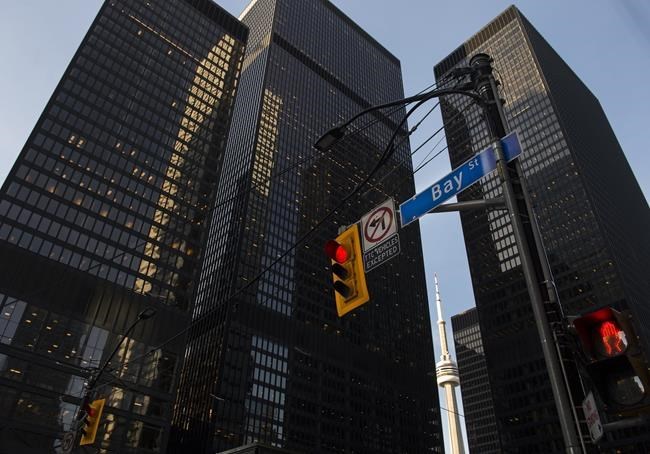TORONTO — Canada's main stock index suffered its worst day in more than four months and U.S. markets fell as bond yields dropped again on worries about a slowing recovery.
The moves were sparked by a big sell-off in overseas markets overnight that washed ashore in North America on Friday.
Investors may have been concerned by Japan putting its capital under a COVID-19 state of emergency over rising infections from the Delta variant and banning spectators from the upcoming Olympics, said Colin Cieszynski, chief market strategist at SIA Wealth Management.
And then U.S. bond yields fell, with the U.S. 10-year dropping to 1.293 per cent, in a sign of concern about the recovery as more people are seeking the safety of bonds and driving down yields.
"I've always said for the last year that this road to recovery could be long and bumpy and the markets have acted like it would be fine and everything's great, no problem," Cieszynski said in an interview.
"But there's always speed bumps along the way. It may not derail the whole thing, but things could be bumpier and slower than the market thought and we're getting a repricing because of that today."
The S&P/TSX composite index closed down 229.39 points to 20,061.21 for its largest decline since Feb. 25. It fell to an intraday low of 19,980.32.
In New York, the Dow Jones industrial average was down 259.86 points at 34,421.93. The S&P 500 index was down 37.31 points at 4,320.82, while the Nasdaq composite was down 105.27 points at 14,559.79.
The situation has been unfolding for a few days as transportation companies such as airlines and cruise lines that are reopening plays turned down, Cieszynski said.
"There's been cracks forming across the markets for a few days now, and today is the kind of day that it's become more apparent or hit the mainstream in a more meaningful way," he said.
"So we'll see is this a one-day event or could this be a sign of a deeper correction or a more extended correction in the near-term."
Cieszynski added that it comes during a slow summer news period ahead of earnings season that starts next week.
"So we're kind of in the doldrums and people are overreacting to everything because there's not much to talk about."
Seven of the 11 major sectors on the TSX were down with consumer staples being the notable exception.
Industrials led the TSX lower, falling 1.6 per cent with Canadian Pacific Railway Ltd. off 5.7 per cent on the day when Kansas City Southern announced a shareholder vote on a takeover by Canadian National Railway Co. scheduled for next month.
Materials was close behind as lower metals prices pushed B2Gold Corp. and Kinross Gold Corp. each down 3.5 per cent.
The August gold contract was down US$1.90 at US$1,800.20 an ounce and the September copper contract was down 5.8 cents at US$4.26 a pound.
The heavyweight financials sector dropped 1.4 per cent with banks getting hammered by lower bond yields that hurt their profitability. Toronto-Dominion Bank shares plunged 3.7 per cent while Bank of Montreal and National Bank were down 1.5 and 1.4 per cent, respectively.
Technology was down 1.3 per cent with Hut 8 Mining Corp. decreasing 5.9 per cent and Shopify Inc. 3.2 per cent lower.
Energy was also lower even though crude oil prices recovered from morning weakness to rise slightly on the day. Imperial Oil decreased 3.3 per cent.
The August crude oil contract was up 74 cents at US72.94 per barrel and the August natural gas contract was up 9.2 cents at US$3.69 per mmBTU.
The Canadian dollar traded for 79.74 cents US after hitting its lowest level since April and compared with 80.16 cents US on Wednesday.
This report by The Canadian Press was first published July 8, 2021.
Companies in this story: (TSX:CP, TSX:CNR, TSX:BMO, TSX:NA, TSX:TD, TSX:IMO, TSX:BTO, TSX:K, TSX:GSPTSE, TSX:CADUSD=X)
Ross Marowits, The Canadian Press



